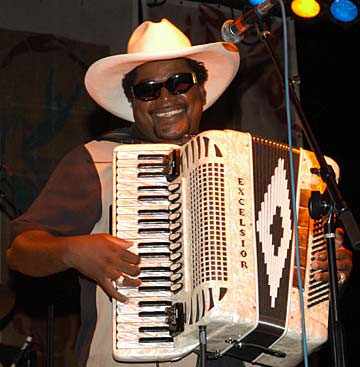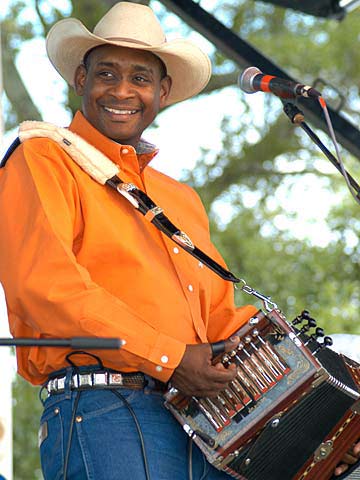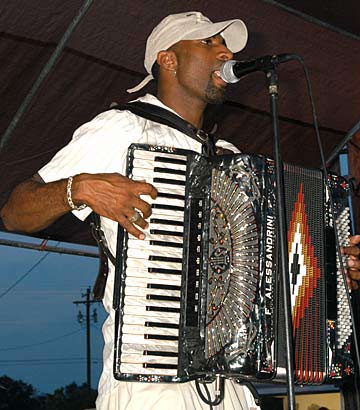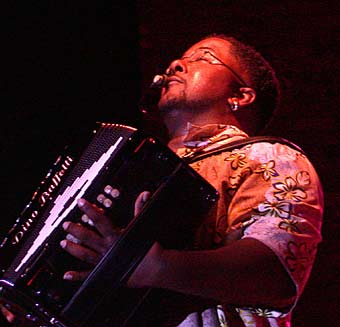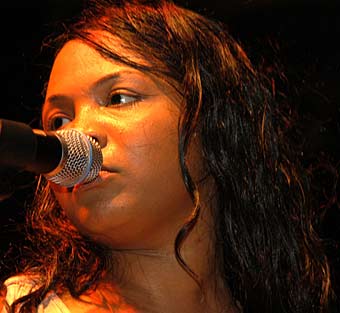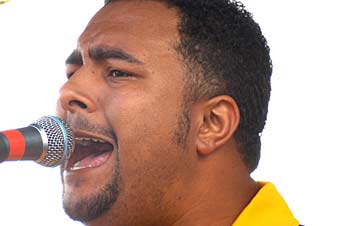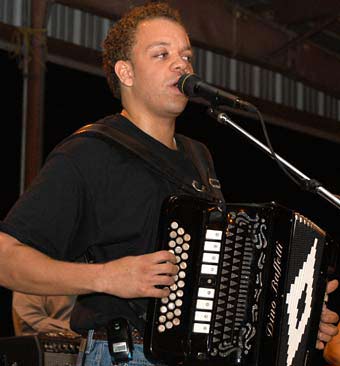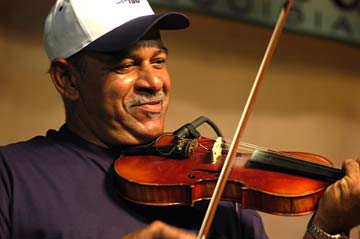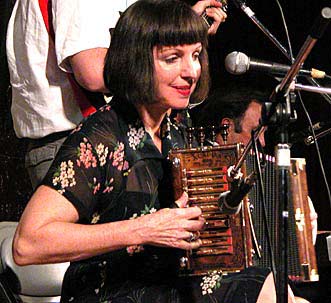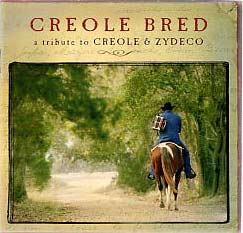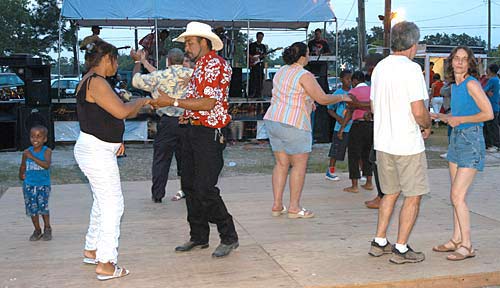|
Archive Files of Cajun, Creole, and Zydeco Musicians |
Creole BredA Tribute to Creole & Zydeco |
|
|
After the success of the Grammy-nominated Evangeline Made, an album produced by Ann Savoy that featured non-Cajun musicians performing Cajun songs, Vanguard Records decided to have Savoy develop a comparable CD of Creole and Zydeco music. The finished product, entitled Creole Bred, ought to be another strong contender for a Grammy. Though she is known mainly as a performer and folklorist of Cajun music, Savoy has all along given prominence to Creole and Zydeco music both in her research and in the music she performs with the Savoy-Doucet Band, Magnolia Sisters, Savoy Family Band, and other groups. Her book Cajun Music: A Reflection of a People includes more than 100 pages on "Old Style Creole and Zydeco Songs," including her interviews with Clifton Chenier, Rockin' Dopsie, John Delafose, Canray Fontenot, and Bois Sec Ardoin, among others. Savoy told Herman Fuselier, entertainment editor of The Lafayette Daily Advertiser, that the songs on the CD "are all my favorites." She has, of course, included several songs by Clifton Chenier, the undisputed King of Zydeco, and songs by other Zydeco musicians, but she also features Creole music, "a style," she says in her liner notes, "formed in the kitchens and house parties, comprised of fiddles, solo diatonic accordions and lone voices." The page facing those notes has a photograph of Creole musicians Bois Sec Ardoin, Freeman Fontenot, and Canray Fontenot sitting on a front porch. It is the music in which Zydeco has its roots and, especially through Bois Sec Ardoin's cousin, Amédée Ardoin, it is also at the root of a lot of Cajun music as well. For audiences unfamiliar with either Zydeco or Creole music, this CD should serve as an excellent introduction. However, Savoy does not intend for it to replace the recordings made by artists who are part of these traditions. Instead, it is a tribute by other musicians from across the nation who recognize that Creole and Zydeco richly deserve an even wider audience. If you like what you hear, then seek out recordings by the Creole and Zydeco musicians who perform on the 12 tracks and by the many other Creole and Zydeco artists who are included in LSUE's music pages, plus scores of others who are not yet listed there. Nathan Williams and the Zydeco Cha Chas play on four cuts, including the opening song, Cyndi Lauper's performance from a female perspective of Clifton Chenier's "Allons à Grand Coteau," the Zydeco version of Joseph Falcon's "Allons à Lafayette" (Grand Coteau, which means big hill, is located about 20 miles north of Lafayette). Williams joins Lauper on vocals for his own "Festival City," which celebrates the Original Southwest Louisiana Zydeco Festival held every year in Plaisance the Saturday before Labor Day. Willams' and his band play Chenier's "I'm Coming Home," with vocals by three contemporary Zydeco standouts: Keith Frank, Rosie Ledet, and Sean Ardoin, Anyone who has heard Ardoin sing his showstopping version of this Zydeco classic will be happy to learn that he has now at least recorded a portion of it. Williams and the Cha Chas also play "Zydeco Two-Step," a Chenier instrumental. The other Chenier song, "Baby Please Don't Go," features piano accordionist Curley Taylor on vocals with Darick and Phillip Campbell of the Campbell Brothers Sacred Steel Guitars on lap steel and guitar. Taylor, a native of Sunset, is relative newcomer as a Zydeco front man. After playing drums with Geno Delafose for several years and being a musician much of his life, he formed his own band, Zydeco Trouble, in 2003 and released his first CD. With Williams as the chief representative on the CD of Zydeco played on the piano accordion, Geno Delafose demonstrates his mastery of the single-row accordion in the Creole tradition. With Geno's accompaniment, Taj Mahal does the French vocals for "'Tit Monde." Cajun fiddler Michael Doucet, who performs on Geno's 2003 CD Everbody's Dancin' and who knows the Canray Fontenot style well, also plays on this song and on "Two-Step de Grand Mallet," with Geno on drums and Taj Mahal on vocals. David Hidalgo of Los Lobos provides the vocals and the drums with Demetrix Thomas on rubboard and Geno on accordion for a highly percussive version of "Mon Conné la Cause," a song better known as "The Flames of Hell" ( as in "save my soul from the flames of hell"). When Michelle Shocked was living in New Orleans, those of us who are fans of her music could hope that she would decide to include Cajun or Zydeco in her repertoire. She's now in California, far away from Louisiana, but home to West Coast Creoles like Andre Thierry, whose families emigrated there looking for a better future. On the CD, she sings Boozoo Chavis' "Paper in My Shoe," the 1954 song that became the first Zydeco hit single. Shocked, whose real name is Karen Michelle Johnson, sings the lyrics in both English and French. It's the kind of song that evokes both joy and images of poverty that Shocked included on her Arkansas Traveler CD. Both Shocked and Chavis, in their own unique way, are examples of living life on their own terms, without making concessions to anyone (including recording companies). The CD also has an example of the very old Creole songs that predate the instrumental traditions. "Mon Homme Est Pas 'Rivé" is performed by the Sweet Honey from the Rock, a female African-American a cappella ensemble whose name comes from the 81st Psalm. According to Marce Lacouture in the version of this song that she got from Inez Catalon, a Creole woman from Kaplan who died in 1994, the song originated at a time when black men had to be home before dark. The lyrics suggest that the singer fears for the safety of her man who has not yet returned. There's also an example of contemporary Zydeco with the Tom Tom Club's version of Keith Frank's "Only the Strong Survive." The CD closes with some old style twin fiddling featuring Ed Poullard and Darol Anger, with his fiddle tuned with low octave strings. They play Canray Fontenot's "Old Carpenter's Waltz." Poullard began life just south of LSUE in Richie before his family moved to Texas. In short, Creole Bred is an excellent companion to Ann Savoy's Evangeline Made. In her interview with Herman Fuselier, Ann explained that Cyndi Lauper had actually been listening to Evangeline Made on the plane on her way to New Orleans the same day that Savoy met her backstage to ask her if she would like to perform on Creole Bred. Together these projects offered by Vanguard Records demonstrate the wide appeal of the music of Southwest Louisiana, both among musicians from all over and among people everywhere who respond with passion to the range of emotions this music evokes. |
|
|
All photographs and text by David Simpson.
